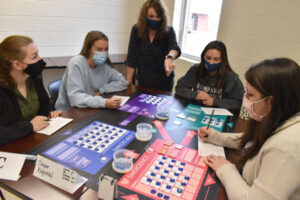The faculty at Reinhardt University continuously look for ways to enhance their curriculum, especially in ways that offer students engaging experiences in their field. After attending a conference, Misty Wright felt inspired to offer a new simulation to the Cauble School of Nursing & Health Sciences nursing students.

Student nurses play a game that simulates an emergency room at a hospital.
Wright, assistant professor of nursing, virtually attended the International Association for Clinical Simulation and Learning (INACSL) conference last summer and discovered a simulation that puts participants in a hypothetical emergency room to build collaborative problem-solving skills. She felt the game would be well suited for Reinhardt’s management leadership nursing course. After consulting with faculty, she applied to Reinhardt’s Center for Innovative Teaching and Engaged Learning to receive a grant to purchase the simulation.
“The game teaches players to be collaborative, innovative and data driven,” said Wright. “It can be used in many settings and does not require a medical background to play. The game is meant to teach the students teamwork and leadership skills. The decisions the students make for their department affect not only the department they manage but other departments in the hospital.”
Reinhardt’s nursing students were introduced to this new way of learning during the Spring 2021 semester. The simulation began with students focusing on their own departments, but they soon realized how much they needed collaboration for success.
“As the game progresses, the students start to realize that they have to work together to improve the flow of patients throughout the hospital. They need to be creative by making decisions to call in staff, negotiate borrowing staff from another department, close their department to new patients because they are at capacity, place two patients in one room…at the end of the gameplay, they score their performance on quality and financials,” said Wright.
The game concluded with a debrief discussion on what felt real, motivations behind decisions and ways to improve. Each “hospital” receives and compares scores to help students recognize how they made assumptions that influenced their decisions.
“This simulation helped me learn a little bit more about how overall the hospital functions,” said nursing student Syndey Mullinax. “It also allowed me to see how certain factors can impact specific floors in the hospital. It [gave me a] little more insight into how hospitals manage patients throughout a 24-hour period, like in the game. This game most certainly gave me an insight into what it is like to work in an emergency room.”
“I learned how important it is for healthcare workers to be critical thinkers whether it’s a staff nurse or a member of management,” said Joseph Cown, nursing student. “There are decisions made in management that affect patient care, cost and profits…this experience [gave me a] better understanding of why wait times were so long in hospitals and how important it was to adapt to the volume of patients during the pandemic.”
Assistant Professor of Nursing Kimberly Parker experienced the realities of hospital work in the past year as she took a night shift house supervisor role at a local hospital.
“With limited resources and an abundance of patients, it has been crucial that individual units work together as part of the larger system,” Parker said.
Parker believes this game proves effective due to the importance of systems thinking in the nursing field.
“As a profession, it is our responsibility to recognize how changing one part of a system – for example, which unit a patient will be assigned – will affect other parts of the system, which then impacts overall patient care, safety, outcomes and the hospital as a whole,” said Parker. “I am excited that our students have an opportunity to participate in this learning activity. This fun, thought-provoking game is a great illustration of how communication and collaboration are necessary to achieve the positive healthcare outcomes we all desire.”
Reinhardt University’s faculty are always looking for ways to innovate their teaching styles, and the resources provided by the Center for Innovative Teaching and Engaged Learning make these ideas possible.

